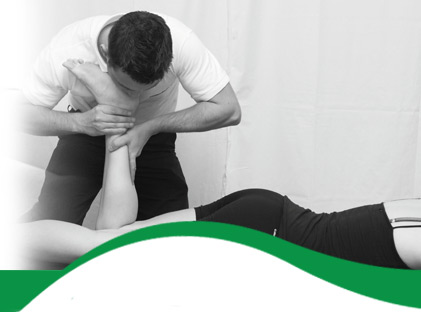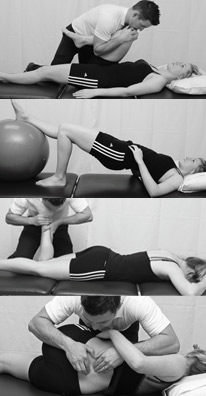'Physiotherapy is a healthcare profession that specialises in the restoration of normal human movement. Physiotherapists use their knowledge of functional anatomy, physiology, pain mechanisms, disease processes and scientific research to apply effective treatment techniques with the goal of reducing unpleasant symptoms and promoting physical activity for each of their patients.'
This section informs you how our physiotherapists work to understand your problems and how physiotherapy is able to cure your symptoms, restore full movement to your body and help resolve your daily and social activity difficulties. Click on each of the green questions below to find out how we work to cure your problems.
How do we work to help understand all your problems?
The Seven Hills physiotherapists believe physiotherapy can only be succesful for you if you are given the opportunity to fully explain the extent of your problems. The experience and extensive ongoing training of all our physiotherapists ensure we are dedicated to working within the guidance of the World Health Organisation (WHO).
The WHO's International Classification of Functioning, Disability and Health (ICF) provides a framework for us to really get to the bottom of your problem. The questions written in green down the right column of the page take this into consideration. Seven Hills Physiotherapy does not only treat a given medical diagnosis or symptoms you describe. We want to know the bigger picture and how it affects your life as a whole. We are interested in every fine detail of your symptoms, as well as if you have any problems moving parts of your body. We are keen to discover whether you are struggling with any daily activities and participation in social activites such as hobbies or work. We want to know your complaints exactly and how you want us to help you. This way of working ensures we don't miss anything that is important to you.
How can physiotherapy cure your symptoms?
Symptoms are the feelings or sensations felt by you. They are often unpleasant and cause discomfort. Their purpose is to act as a part of your body's protective alarm system and provide you with a warning when your body is damaged or may be at risk of damage. Examples of symptoms are pain, aching, burning, tingling, pins and needles and numbness.
Symptoms occur after an injury to help the structure heal. The unpleasant experience of pain prevents you from placing too much stress on the damaged structure whilst it is still healing. However, experience has taught us the majority of people suffer pain for reasons unknown to them. In this instance, your alarm system (symptoms) acts as a warning that a structure may be at risk of damage. This may simply be due to parts of your body becoming stiff or tight or weak through poor posture, altered movement patterns, overuse or even not using parts of the body enough. Your body is able to adapt and tolerate this improper use for so long until eventually it tells you enough is enough by activating its warning alarm system, unpleasant symptoms.
How you describe your symptoms, as well as other information, provides our physiotherapists with clues to the structure that is affected. For example, pins and needles, burning and shooting pain would suggest it is likely you have a nerve problem. A deep ache may indicate a joint problem. Using all the clues, your physiotherapist will assess the health and movement of the suspected structures (nerve, muscle, joint etc).
Your physiotherapist will provide treatment to the structures they feel are the cause of your problems based on the best available evidence and their wealth of experience. Our experience and scientific research have consistently proven physiotherapy treatment to be effective in returning the health and movement of your body's structures and tissues to normal. Your brain will recognise this and realise there is no longer a risk of damage to your structures. As a consequence it will switch your warning alarm off. As a result you will no longer experience the unpleasant symptoms.
How can physiotherapy help restore full movement to your body?
A structure or several structures in your body may be stiff, tight, weak or unstable. These problems are all known as impairments.They can occur with or without injury or damage and simply due to poor posture or misusing your body. The Seven Hills physiotherapists all have advanced skills in assessing the structures of your body to the finest detail. Detailed assessment allows us to identify which structures are causing your body to move less efficiently than it should. By applying skilled hands-on treatment techniques and providing rehabilitative exercise programmes our physiotherapists enable your body to move to its maximum potential.
How can physiotherapy help you with your daily and social activities?
Your daily and social activites may become suddenly affected in the case of an injury. However, in the case of slow and progressive symptoms and impairments (stiffness, weakness etc) it may be months or even years before activity becomes affected. Unfortunately, it is likely, if left untreated, your activities will eventually become affected. You may notice basic daily activities such as dressing or housework becomes difficult. Your social activities and interests such as sports participation or work may also be affected. Activity difficulties can be prevented or resolved by resolving the symptoms and movement impairments as described above.
Do parts of your body cause you pain, ache, feel stiff, or seem weak or unstable?
Do parts of your body cause you pins and needles, tingling, burning, or feel numb?
Do any of these complaints prevent your body from moving or working how it should?
Do any of these complaints disturb your sleep or make it difficult to relax?
Do any of these complaints or loss of movement in your body mean there are things in your life that you struggle to do or can’t do at present?
Do you feel your life would be more comfortable and enjoyable if somebody could help you with these complaints?
If you answered YES to any, or all, of these questions then the Seven Hills Physiotherapy team are here to help. We will take great interest in listening to YOUR problems so we can find out how YOU would like us to help YOU lead a more comfortable and enjoyable life.






